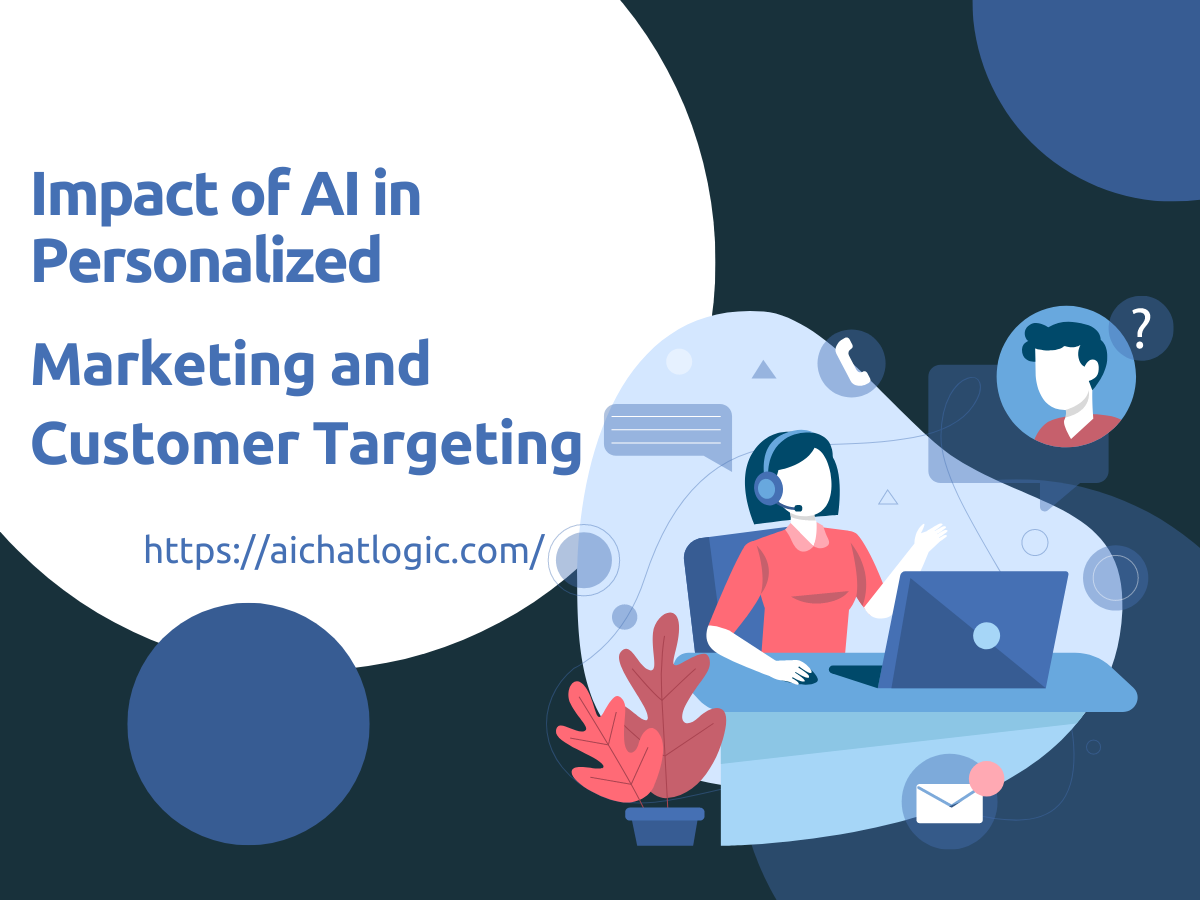1. Introduction
In the age of information overload, customers are constantly bombarded with marketing messages. Traditional one-size-fits-all marketing approaches are no longer effective in capturing the attention of consumers. This is where personalized marketing comes into play, leveraging AI to deliver targeted content that resonates with individual customer.
2. Understanding Personalized Marketing
Defining Personalized Marketing
Personalized marketing involves tailoring marketing messages and experiences to meet the unique needs and preferences of individual customers. It goes beyond demographic segmentation and takes into account factors such as browsing behavior, purchase history, and customers feedback.
Importance of Personalized Marketing
Personalized marketing holds immense importance in today’s competitive landscape. It enables businesses to build stronger relationships with customers, foster trust and loyalty, and ultimately drive sales. By delivering relevant content at the right time, businesses can significantly improve customers engagement and satisfaction.
3. Leveraging AI for Personalized Marketing
AI has emerged as a game-changer in personalized marketing, empowering businesses with advanced capabilities to analyze vast amounts of data, predict customers behavior, and deliver personalized experiences. Here are some key ways AI is revolutionizing personalized marketing.
AI-powered Data Analysis
AI algorithms can process and analyze large volumes of customers data, including browsing history, purchase patterns, and social media interactions. This enables businesses to gain valuable insights into individual customers preferences and behavior, helping them tailor their marketing efforts accordingly.
Predictive Analytics
By leveraging machine learning algorithms, businesses can predict customers behavior and anticipate their needs. Predictive analytics enables businesses to understand which products or services a customers is likely to be interested in, allowing for targeted marketing campaigns and recommendations.
Customer Segmentation
AI algorithms can segment customers based on various parameters, allowing businesses to create targeted messaging for different customers groups. By grouping customers with similar preferences together, businesses can ensure that the right message reaches the right audience, resulting in higher engagement and conversions.
4. The Benefits of Personalized Marketing
Enhanced Customer Engagement
Personalized marketing creates a sense of relevance and individuality for customers, increasing their engagement with brands. By delivering content that aligns with their interests, businesses can capture and hold their attention, fostering a deeper connection.
Improved Conversion Rates
When customers receive personalized recommendations and offers, they are more likely to make a purchase. By tailoring marketing messages to individual preferences, businesses can significantly improve conversion rates and drive revenue growth.
Increased Customer Loyalty
Personalized experiences make customers feel valued and understood, leading to increased loyalty. When businesses demonstrate that they understand their customers’ needs and preferences, customers are more likely to remain loyal and continue their relationship with the brand.
5. Overcoming Challenges in Personalized Marketing
Data Privacy and Security
As businesses collect and analyze large amounts of customers data, ensuring data privacy and security becomes paramount. Companies must adopt robust data protection measures and comply with regulations to build trust and maintain the confidentiality of customers information.
Ethical Considerations
Personalized marketing raises ethical concerns regarding the collection and use of customers data. It is essential for businesses to be transparent about data usage and obtain customers consent. Respecting customer privacy and addressing ethical concerns is crucial for maintaining a positive brand image.
Balancing Automation and Human Touch
While AI plays a pivotal role in personalized marketing, maintaining a human touch is equally important. Businesses must strike a balance between automation and personalization to avoid losing the personal connection with customers. Human interaction and empathy remain vital in building long-term customer relationships.
6. AI in Customer Targeting
Data-driven Customer Profiling
AI enables businesses to create detailed customer profiles by analyzing various data points. By understanding customer preferences, demographics, and behavior patterns, businesses can craft highly targeted marketing campaigns that resonate with individual customers.
Real-time Behavioral Tracking
AI-powered tools can track and analyze customer behavior in real-time. Businesses can monitor customers’ interactions with their websites, apps, and other touchpoints to gain insights into their preferences and intent. Real-time behavioral tracking allows for immediate adjustments to marketing strategies to optimize customer targeting.
Dynamic Content Delivery
AI algorithms can deliver personalized content dynamically, tailoring it based on customer preferences and behavior. By presenting customers with relevant content at different stages of the buyer’s journey, businesses can increase engagement and influence purchasing decisions.
7. The Future of AI in Personalized Marketing
Hyper-personalization
The future of personalized marketing lies in hyper-personalization, where AI technologies will enable businesses to provide even more tailored experiences. By leveraging advanced algorithms and predictive analytics, businesses can anticipate individual customer needs and deliver personalized content on a hyper-individual level.
Voice and Visual Search Optimization
With the rise of voice assistants and visual search technologies, businesses must optimize their marketer strategies accordingly. AI-powered voice search and image recognition tools can help businesses deliver personalized content to users searching through voice commands or images.
AI-driven Chatbots and Virtual Assistants
AI-driven chatbots and virtual assistants are becoming increasingly sophisticated, enabling businesses to provide personalized customer support and recommendations. These AI-powered assistants can understand customer queries, analyze data, and deliver relevant responses, enhancing the overall customer experience.
8. Conclusion
AI has transformed personalized marketer and customer targeting, enabling businesses to deliver tailored experiences, drive engagement, and foster customer loyalty. By leveraging AI-powered data analysis, predictive analytics, and customer segmentation, businesses can understand individual customer preferences and behavior. The benefits of personalized marketer include enhanced customer engagement, improved conversion rates, and increased customer loyalty. However, businesses must address challenges such as data privacy, ethical considerations, and finding the right balance between automation and human touch. As AI continues to evolve, the future of personalized marketer holds great potential with hyper-personalization, voice and visual search optimization, and AI-driven chatbots and virtual assistants.
FAQs
1. How does personalized marketing benefit businesses?
Personalized marketing benefits businesses by driving customer engagement, improving conversion rates, and increasing customer loyalty. It allows businesses to deliver targeted content and recommendations that align with individual customer preferences.
2. What role does AI play in personalized marketing?
AI plays a crucial role in personalized marketing by analyzing vast amounts of customer data, predicting behavior, and enabling businesses to deliver tailored experiences. AI-powered algorithms help businesses understand individual customer needs and automate personalized content delivery.
3. What are the challenges in personalized marketing?
Challenges in personalized marketing include data privacy and security, ethical considerations, and finding the right balance between automation and human touch. Businesses must address these challenges to build trust, maintain privacy, and provide a seamless customer experience.
4. How can businesses overcome data privacy concerns in personalized marketing?
Businesses can overcome data privacy concerns by implementing robust data protection measures, complying with regulations, and being transparent about data usage. Obtaining customer consent and ensuring secure data storage and transmission are crucial for maintaining trust.
5. What is the future of AI in personalized marketing?
The future of AI in personalized marketing lies in hyper-personalization, voice and visual search optimization, and AI-driven chatbots and virtual assistants. These advancements will enable businesses to provide even more tailored experiences, anticipate customer needs, and enhance customer interactions.












+ There are no comments
Add yours